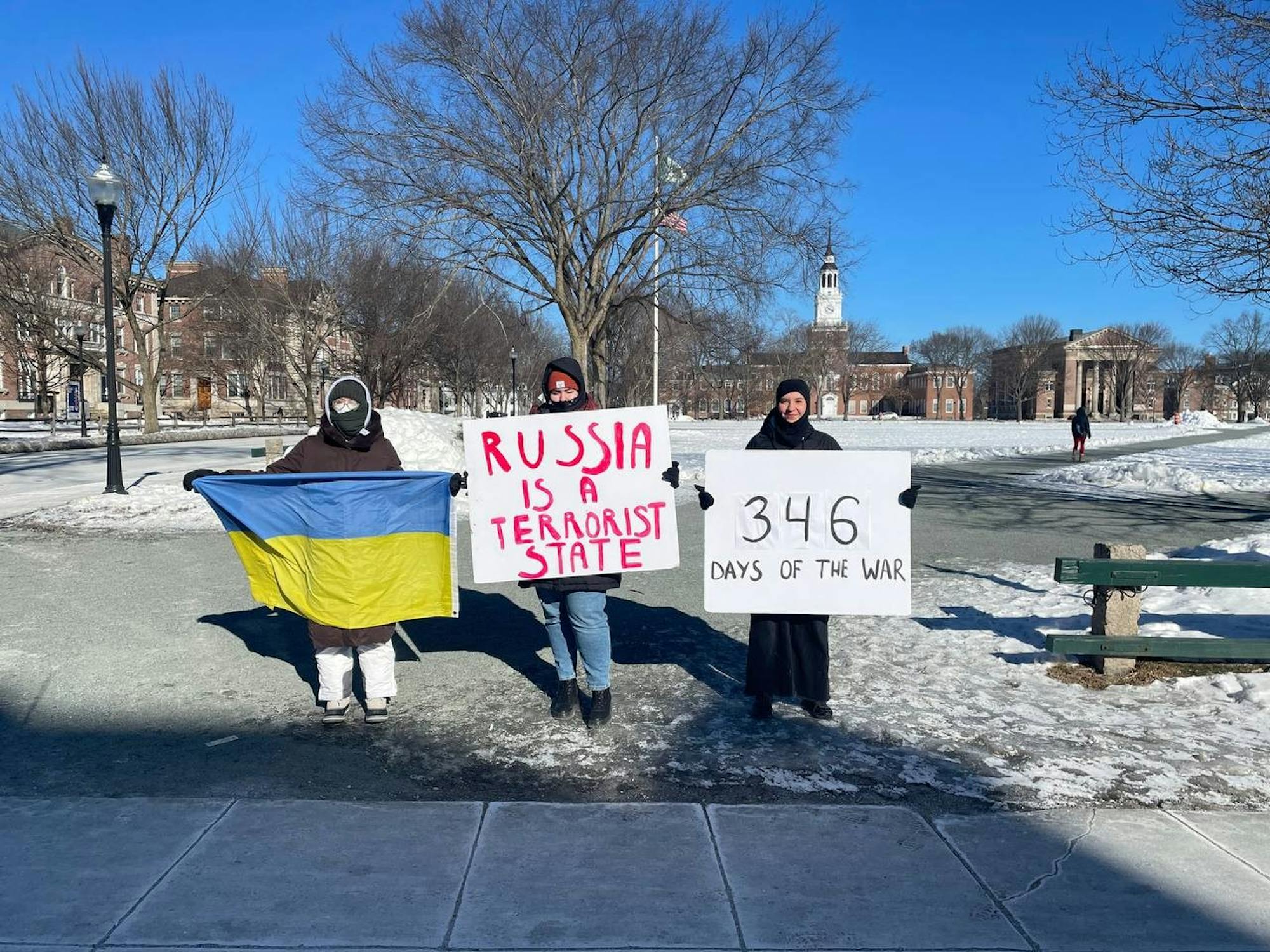Since Jan. 19, the Dartmouth Student Alliance for Ukraine has gathered on the Green every morning at 10 a.m. for half an hour to silently protest the Russian war in Ukraine. Ukrainian students and faculty said they are working to support Ukraine to win the war, as it has killed more than 7,100 Ukrainian civilians and wounded more than 11,600, according to the United Nations High Commissioner for Human Rights, and will reach its one-year anniversary on Feb. 24.
According to Dartmouth Student Alliance for Ukraine president Zhenia Dubrova ’24, the Alliance is holding these protests to increase the visibility of the war and to reinvigorate support amid a period of “war fatigue.” Other goals of the Alliance are to maintain an updated, visible social media profile highlighting the devastation of the war and to promote events such as the protest auction that was held in fall 2022.
“[The protests] are to remind people about the war and how the devastation continues daily and how people’s lives continue to be upended,” Dubrova said.
“[Our hope] is for everyone to have a better understanding of [not just the war], but also the history of Ukraine and how it should be treated as an independent country,” Alliance member and organizer Tonia Zakorchemna ’23 said.
Zakorchemna highlighted the urgency of making sure the war is not relegated to the back of people’s minds.
“[The protests] put a human face on the war in Ukraine,” Zakorchemna said. “It’s one thing to read about it in the paper, but to see it in person affecting people in your community — people you go to class with and participate in activities with — breaks the bubble and reminds people that the war is not as far away as people think it is.”
According to CNN, Russia has been escalating its battle in Bakhmut in eastern Ukraine, and the Ukrainian government is attempting to get civilians out of the city after months of fierce fighting that have cut off water supply and power. In January, Russia also attacked energy infrastructure in Kyiv and other cities with missiles, according to the New York Times, which halted its electric transit system.
Zakorchemna said that protest organizers have also been perplexed by some responses they have received from other campus organizations. For example, she added that the conservative publication The Dartmouth Review questioned the Alliance’s purpose for the protests in a paper released for this year’s Winter Carnival.
“We’ve been called Nazis [and] terrorists by quite a few community members who drive past our protests,” Dubrova said. “There’s been a myriad of reactions [to our protests], but what we’re mainly looking for is [receiving] any reaction. Part of the reason for holding these protests is to welcome questions and comments from students, faculty and the Upper Valley community; we encourage them to ask questions before making assumptions [about our intentions].”
Looking forward, the Alliance hopes to continue the daily protests until at least the end of spring term, Dubrova said.
Victoria Somoff, a professor in the Russian department — which is soon to be renamed the Eastern European, Eurasian and Russian studies department — wrote that while Dartmouth students, New Hampshire residents and other global citizens can educate themselves about the war and provide donations, political change will be required to ensure Ukraine’s survival.
“For Ukraine to join the EU and NATO is not a question of benefits or preferences – it is a question of survival of the nation – so it is an existential question,“ Somoff wrote. “Ukraine will always be a target of Russia's aggression and once this war ends, it is inevitable that it will only be a matter of time for a new attack from Russia.”
Despite the devastation of the war, Zakorchemna said that the Ukrainian community on campus has worked together and served as a support system during the conflict.
“When I arrived on campus in the fall of 2019, I was the first Ukrainian student Dartmouth had in many years, and today there are about 15 Ukrainian [undergraduate and graduate] students,” Zakorchemna said.
Correction appended (Feb. 20, 2:40 p.m.): A previous version of this article contained inaccurate information and attributions about student reactions to the protest, future plans for the protests and the Ukrainian community on campus. It also incorrectly described sentiments about hopes for the end of the war and global political change. We regret this oversight. The article has been updated.




